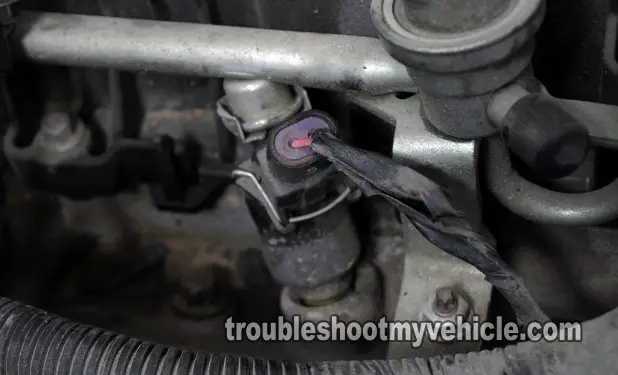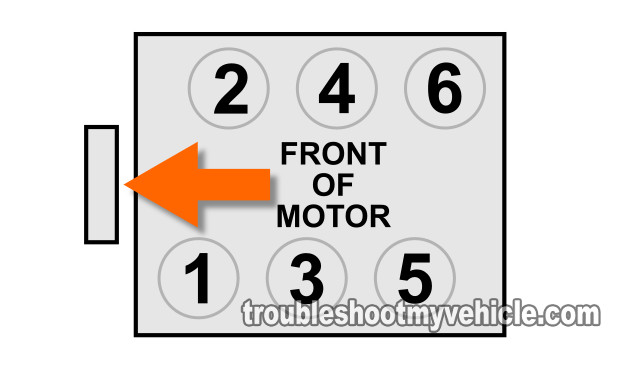
A bad fuel injector can cause your 3.8L Buick (or Chevrolet, or Pontiac, or Oldsmobile) to idle rough, miss, and make the check engine light come on (if the vehicle is OBD II equipped, you could see misfire codes: P0300, P0301, P0302, P303, P0304, P0305, P0306).
The good news is that testing for a bad fuel injector is super easy on the 3.8L GM V6.
There are many ways to test for a bad fuel injector and in this article I'll present to you one of the simplest of all: verifying the resistance of the fuel injector with a multimeter.
This article is one in a series of misfire troubleshooting articles for the 3.8L V6 engine used in several of the Buick, Chevrolet, Pontiac, Oldsmobile models. The starting point of this testing series is: How To Diagnose Misfire Codes P0300-P0306 (GM 3.8L).
Contents of this tutorial:
ES ![]() You can find this tutorial in Spanish here: Cómo Probar Los Inyectores De Combustible (GM 3.8L) (at: autotecnico-online.com).
You can find this tutorial in Spanish here: Cómo Probar Los Inyectores De Combustible (GM 3.8L) (at: autotecnico-online.com).
Symptoms Of A Bad Fuel Injector
Each of the 6 cylinders that make up the 3.8L engine in your car (or mini-van) need 3 things to produce power: fuel, air, and spark. As you're already aware, the fuel injector is the one tasked with injecting the gasoline that the cylinder needs.
When one (or more) fuel injectors fail, your car or mini-van's 3.8L V6 engine is not gonna' run on all cylinders and you're gonna' feel it when the engine idles and especially when you give it gas (to move the car or mini-van).
Here are some more specific symptoms:
- Rough idle.
- Engine misfire under load (when you're giving it gas).
- Bad gas mileage.
- Fuel injector failure code present.
- P0201: Injector #1 Control Circuit.
- P0202: Injector #2 Control Circuit.
- P0203: Injector #3 Control Circuit.
- P0204: Injector #4 Control Circuit.
- P0205: Injector #5 Control Circuit.
- P0206: Injector #6 Control Circuit.
- Misfire code present.
- P0301: Cylinder #1 Misfire.
- P0302: Cylinder #2 Misfire.
- P0303: Cylinder #3 Misfire.
- P0304: Cylinder #4 Misfire.
- P0305: Cylinder #5 Misfire.
- P0306: Cylinder #6 Misfire.
NOTE: On 1998 model year and newer, the PCM is able set specific fuel injector troubles codes (when they fail). Unfortunately, this rarely happens in real life. What you'll usually see will be a misfire trouble code instead of a bad fuel injector code.
What Tools Do I Need To Test The 3.8L Fuel Injectors?
You don't need anything exotic or expensive to test the fuel injectors on your 3.8L equipped GM car or mini-van. Here's a basic list of tools you'll need:
- A multimeter.
- This is the most important tool you'll need, is a multimeter. Your multimeter can either be an analog one or a digital one.
- You'll only be using the multimeter to check resistance (Ohms).
- If you need to upgrade or buy a multimeter, check out my recommendation: Buying A Digital Multimeter For Automotive Diagnostic Testing (found at: easyautodiagnostics.com).
- Scan tool.
- To actually test the fuel injectors, you don't need a scan tool (since a scan tool can't dynamically test the fuel injectors). But, having one makes the whole process easier since you're able to retrieve any diagnostic trouble codes (DTCs) stored in the PCM memory.
- Don't have one? Check out my recommendation: Abe's Scan Tool Recommendation.
- Pen and paper to write down your fuel injector resistance test results.
Where To Buy The Fuel Injectors And Save
There's a good chance that you can buy the original AC Delco (Delphi) fuel injector online for a whole lot cheaper than somewhere local.
The following links will help you comparison shop for the fuel injectors:
Not sure if the above fuel injectors fit your particular 3.8L? Don't worry, once you get to the site, they'll make sure it fits by asking you the specifics of your vehicle. If the above don't fit, they'll find the right ones for you.
The Fuel Injector Test

The engine in your 3.8L Chevy (or Buick, or Oldsmobile, or Pontiac) can not be cold or too hot to do this fuel injector test. So if you have been running the engine for an extended period of time, let it cool down about an hour. If the engine is completely cold, start'er up and let'er run for about 20 minutes.
If you have a scan tool, check that the engine coolant temperature sensor reading is at around 100° F.
To be able to accommodate all types of experience levels, and to keep this test as simple as possible, the following steps assume that you'll be testing all 6 fuel injectors.
- 1
Disconnect the fuel injectors from their electrical connectors.
- 2
Place your multimeter in Ohms mode.
- 3
Probe the male spade terminals of the fuel injector with the multimeter test leads to get an Ohms measurement.
It doesn't matter what color test lead you use to test either of the two fuel injector male spade terminals, the polarity of the leads is not important when testing the resistance (Ohms) of the fuel injectors. - 4
Write down the resistance (Ohms) value recorded on the multimeter for each fuel injector. Don' forget to write down what cylinder that reading belongs to.
- 5
The fuel injector resistance should be around 11.4 to 12.6 Ohms (although on your specific GM 3.8L car, this value might be a little different).
- 6
Repeat test steps 1 through 4 on the remaining 5 fuel injectors.
Alright, with the resistance values in hand, of all 6 fuel injectors, let's interpret your results. One more thing, don't worry if the resistance values don't match the resistance value in Step 5. What you're looking for is that one fuel injector that has a completely different resistance value from all of the rest.
OK, let's analyze your test results:
CASE 1: All of the multimeter resistance values are nearly identical. This result indicates that the fuel injectors are OK and are not causing the misfire code or condition.
If your 3.8L car or mini-van is suffering from a ‘dead’ cylinder (misfire or rough idle), I suggest taking a look at the following tutorial for more troubleshooting/diagnostic tests:
CASE 2: One of the six multimeter resistance values is drastically different. Retest all six fuel injectors. If the resistance values are the same as before, then the fuel injector that registered the totally different resistance value is bad. Replace the fuel injector.
If you'd like to buy the original AC Delco (or aftermarket) fuel injector and save a few bucks, take a look at the section: Where To Buy The Fuel Injector And Save.



